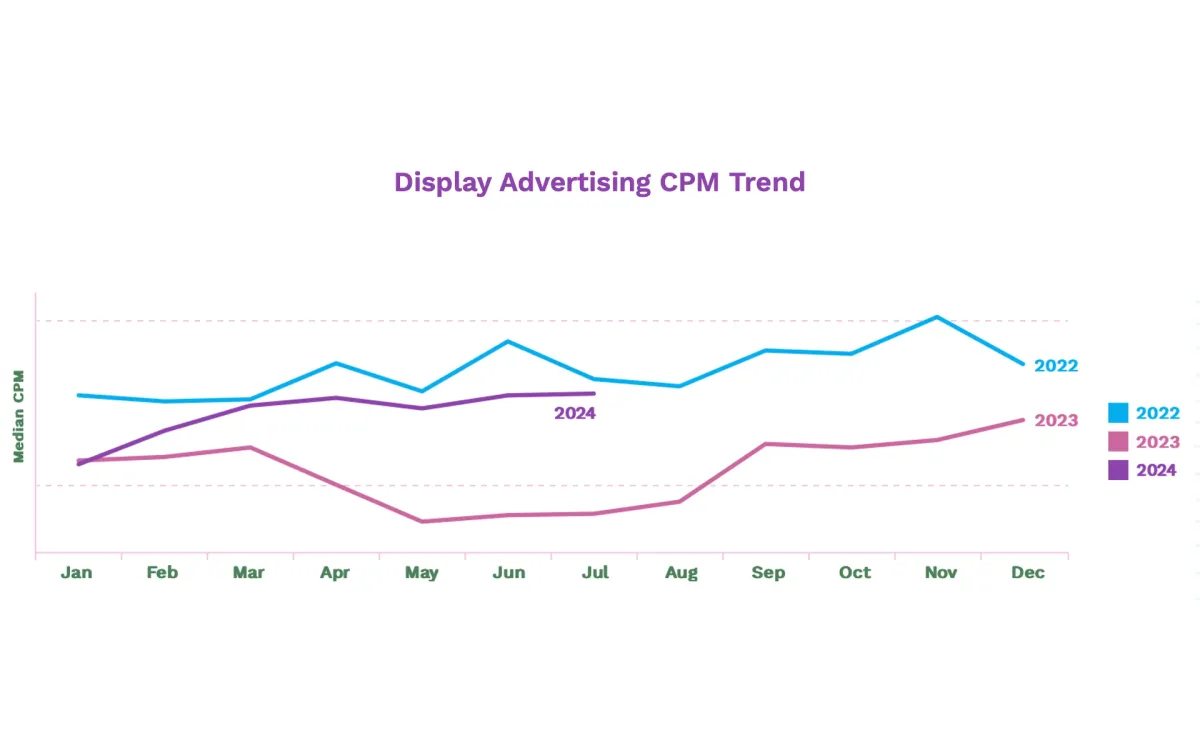
AdRoll's recently released Q3 2024 State of Digital Marketing Report sheds light on the current state of digital advertising, revealing significant shifts in cost-per-mille (CPM) trends and advertiser strategies. The report, which analyzes data from over 20,000 online businesses, offers valuable insights into the evolving digital marketing landscape.
According to the report, display advertising CPM in Q2 2024 was 47% higher than the previous year. This increase signals a return to a more typical advertising spend trajectory, contrasting with the budget cuts and pessimism observed in Q2 2023. The trend suggests a renewed confidence in digital advertising among marketers.
In the social media sphere, CPM trends have shown greater stability compared to the previous year. Notably, TikTok's CPM has been lower and more consistent in 2024 than in 2023. Pinterest, however, experienced a 30% average increase in CPM during Q2 2024 compared to the same period last year. The report indicates that the CPM gap among Meta, TikTok, and Pinterest has narrowed, pointing to a more balanced approach in budget allocation by social media advertisers.
The report highlights several economic factors influencing the advertising landscape. The U.S. inflation rate dropped below 3% in July 2024, marking the lowest rate since March 2021. This cooling inflation has boosted confidence in potential interest rate cuts, which could stimulate economic activity and consumer spending.
However, the U.S. consumer sentiment index has been trending downward since Q2 2024, reaching an 8-month low in July. This decline signals growing consumer anxiety about the economy and personal financial well-being, which could impact advertising return on investment (ROI) across various industries.
The upcoming U.S. presidential election adds another layer of complexity to the advertising market. With the race tightening following President Biden's exit and endorsement of Vice President Harris, political ad spending is expected to surge in the coming months. This increase could drive up advertising costs as the holiday shopping season approaches, potentially creating challenges for advertisers across different sectors.
Andrew Pascoe, Vice President of Data Science Engineering at NextRoll, AdRoll's parent company, emphasized the importance of first-party and zero-party data strategies in light of Google's updated approach to third-party cookie deprecation. According to Pascoe, advertisers who continue to rely solely on third-party cookies may face shrinking target audiences and declining campaign performance.
Google's new approach, announced on July 22, 2024, offers an "elevated" version of the existing option for Chrome users to opt out of third-party cookies. This change does not signal an abandonment of Google's Privacy Sandbox initiative, but rather a continued investment in developing APIs to replace third-party cookies.
The report suggests that as consumers become increasingly privacy-conscious, they are likely to favor more privacy-friendly options over third-party cookies when given a choice. This shift could lead to the gradual abandonment of third-party cookies by consumers over time.
Advertisers are advised to monitor their campaign performance closely as they approach the last quarter of the year, given the potential impact of the election and holiday shopping season on advertising costs and effectiveness.
The AdRoll State of Digital Marketing Report provides insights into various key performance indicators, including average CPM trends for display ads, Meta ads, TikTok ads, and Pinterest ads. The report is updated on a quarterly basis, offering marketers regular access to current trends and insights in the digital advertising space.
Key facts from the report
- Display advertising CPM in Q2 2024 was 47% higher than Q2 2023
- TikTok's CPM was lower and more stable in 2024 compared to 2023
- Pinterest's CPM increased by 30% on average in Q2 2024 compared to Q2 2023
- U.S. inflation rate dropped below 3% in July 2024, the lowest since March 2021
- U.S. consumer sentiment index reached an 8-month low in July 2024
- Google announced an update to its third-party cookie deprecation plan on July 22, 2024
- The report analyzes data from more than 20,000 online businesses across various industries

